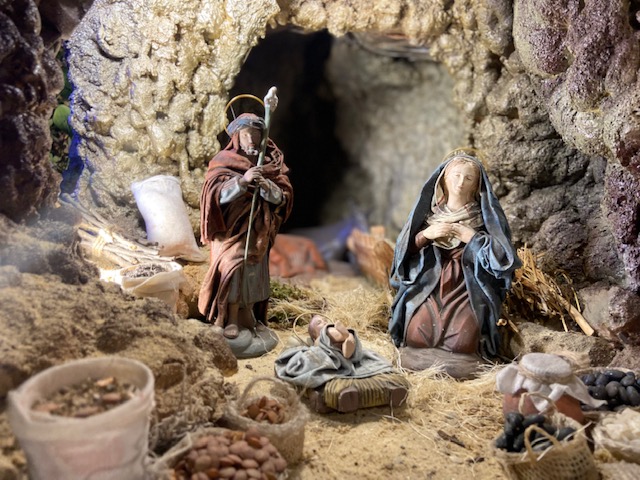Pope: Contemplate greatness of God’s love in simplicity of a crèche
VATICAN CITY — Whether simple or elaborate, the same every year or constantly changing, a Nativity scene echoes “the beauty of our faith,” Pope Francis wrote.
Marking the 800th anniversary of St. Francis of Assisi putting together the first Christmas crèche in a cave in Greccio, Italy, the Vatican publishing house compiled texts by Pope Francis about Nativity scenes and asked him to write a special introduction.
A key message of the Nativity scene is that the mystery of Christmas “loves to hide within what is infinitely small,” the pope wrote in “Christmas at the Nativity,” which was released in English in the United States by New City Press.

“Awe and wonder are the two feelings that move everyone, young and old, before the Nativity scene, which is like a living Gospel overflowing from the pages of Holy Scripture,” he wrote.
The Italian edition of the book went on sale Nov. 21, just two days before the Vatican post office was to begin selling its 2023 Christmas stamps, which also celebrate the staging of a live Nativity scene in Greccio by St. Francis in 1223.
“The Incarnation of Jesus Christ remains the heart of God’s revelation, although it is easily forgotten that its unfolding is so unobtrusive, to the point of going unnoticed,” the pope wrote. “Littleness, in fact, is the way to encounter God.”
“Safeguarding the spirit of the Nativity scene becomes a healthy immersion in the presence of God manifested in the small, sometimes trivial and repetitive, everyday things,” he continued.
“The shepherds in the manger are those who welcome God’s surprise and live in wonder at their encounter with him, adoring him: in littleness they recognize the face of God,” he said. “Humanly we are all inclined to seek greatness, but it is a gift to know how to really find it: to know how to find greatness in that smallness that God so loves.”
On Christmas night, the angels lead the shepherds to a baby born in a manger — “not a sign of power, self-sufficiency or pride. No. The eternal God is reduced to a helpless, meek, humble human being. God lowered himself so that we could walk with him and so that he could stand beside us, not above and far from us.”
Pope Francis’ introduction to the book also included a special message to young people.
While the night sky is filled with an infinite number of stars, in the Christmas story “a special star stands out, the one that prompted the Magi to leave their homes and begin a journey, a journey that would lead them where they did not know.”
“It happens the same way in our lives,” the pope wrote. “At a certain moment some special ‘star’ invites us to make a decision, to make a choice, to begin a journey. We must forcefully ask God to show us that star that draws us toward something more than our habits, because that star will lead us to contemplate Jesus, that child who is born in Bethlehem and who wants our full happiness.”
Pope Francis also noted that the first Nativity scene in Greccio consisted of only a “crib with the hay, the ox and the donkey.”
“Before the Christmas scene, the people who flocked to the place manifested an unspeakable joy, never tasted before,” he said. “Then the priest, at the manger, solemnly celebrated the Eucharist, showing the link between the Incarnation of the Son of God and the Eucharist. On that occasion, there were no figurines in Greccio: the Nativity scene was created and experienced by those who were present.”
This article was written by Cindy Wooden, Catholic News Service.


